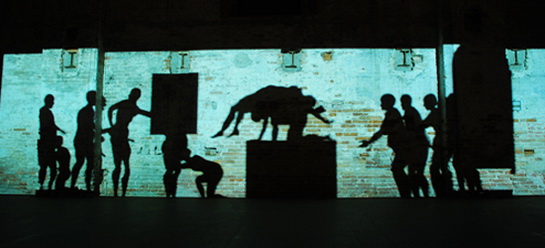
Courtesy of the artist and Greene Naftali Gallery
This evening at the Guggenheim, it was announced that Paul Chan is the winner of the 2014 Hugo Boss Prize. Chan is the tenth artist to win the biennial $100,000 art prize, which is administered by the Guggenheim Foundation, and singles out an artist whose body of work is considered an outstanding contribution to contemporary art. “The prize is firmly established as one of the art world’s most resonant accolades, honoring contemporary practices of enduring power and influence,” noted museum director Richard Armstrong.
“It reflects our understanding of what are the most trenchant issues in contemporary art… It’s like a Biennial in a way,” added deputy director Nancy Spector.
Chan is known for his provocative animated film projections that reference a variety of cultural icons from Biggie Smalls to William Blake, for his his invented fonts, and for having staged Beckett’s “Waiting for Godot” in New Orleans in 2007. As a political activist, Chan spent time in Iraq from 2002 to 2003 with an anti-war activist group and created a video of what he called “the small quotidian moments life in Baghdad.” More recently, he has stepped into the role of experimental publisher, and through his press Badlands Unlimited has published works by Hans Ulrich Obrist, Calvin Tomkins, and Yvonne Rainer among many others. The decision to select Chan was unanimous among the jurors.
This year’s nominees were Sheela Gowda, Camille Henrot, Hassan Khan, and Charline von Heyl. The jury was chaired by Spector, and included Katherine Brinson, Associate Curator, Solomon R. Guggenheim Museum; Doryun Chong, Chief Curator, M+, Hong Kong; Tim Griffin, Executive Director and Chief Curator, The Kitchen, New York; Polly Staple, Director, Chisenhale Gallery, London; and Ari Wiseman, Deputy Director, Solomon R. Guggenheim Foundation.
In addition to the substantial monetary prize, Chan will be granted a solo exhibition at the Guggenheim in 2015. Recent winners include Danh Vo, Hans-Peter Feldmann, and Emily Jacir. Matthew Barney won the prize in its first year, 1996.